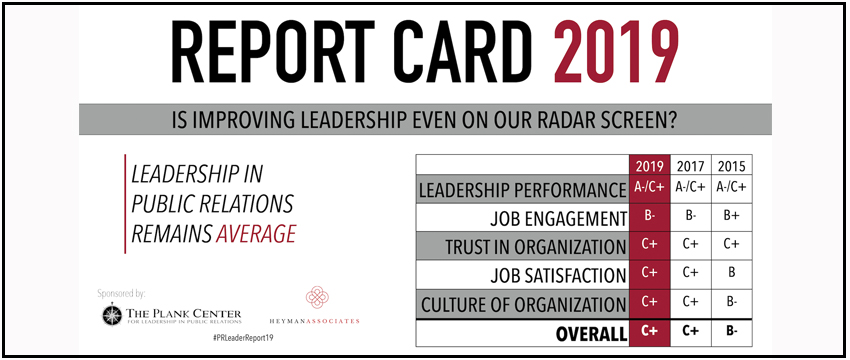Public Relations Leaders Earn a “C+” in The Plank Center’s Report Card 2019

Public Relations Leaders Earn a “C+” in The Plank Center’s Report Card 2019
Bryan Reber and Juan Meng of the Department of Advertising and Public Relations were among a team of researchers evaluating perceptions about public relations leadership as part of The Plank Center’s Report Card 2019.
The 2019 report was released the end of September and reflects little change in public relations leadership from studies in 2015 and 2017. PR leaders received an overall grade of “C+” in 2019, similar to previous studies, though down a bit overall in the last five years.
“The impression about top communication leaders’ performance hasn’t changed nor improved much in the professional communication community, based on results from our three Report Cards,” said Meng, co-investigator and associate professor at Grady College. “Such consistent but not-so-promising gaps present persuasive evidence that merits serious attention. Improving top communication leaders’ performance shall be a priority. More critically, such changes and actions shall be well communicated to and received by employees in order to close the gaps.”
The Report Card 2019 had responses from 828 PR leaders and professionals nationwide, who evaluated five fundamental areas of leadership linked to outcomes in our field—organizational culture, quality of leadership performance, trust in the organization, work engagement and job satisfaction. While grades overall were little changed from 2017, job engagement, trust and job satisfaction dropped a bit. Even more concerning, previously reported gaps in evaluations grew more:
- Differences between men’s (45.8%) and women’s (54.2%) perceptions of the organizational culture and the quality of leadership performance deepened. Similar to Report Card 2017, gaps between top leaders’ (35.1%) and others’ (64.9%) perceptions of all five evaluated areas remained wide.
- Women in public relations remained less engaged, less satisfied with their jobs, less confident in their work cultures, less trusting of their organizations and more critical of top leaders compared to men.
- Previous concerns of both men and women about two-way communication, shared decision-making, diversity and culture were again present.
The consistently average grades, and the sharp and growing differences among surveyed professionals noted above, beg the question of whether improving leadership in the field is a priority in the profession. Numerous blogs, articles and research studies suggest it is important and needed. However, as Bill Heyman, CEO and president of Heyman Associates, and a co-sponsor of the study, reflected, “Talking about needed changes and improvements in leadership won’t accomplish the change. We need more leaders who live and model the changes.”
| Report Card on PR Leaders | 2019 | 2017 | 2015 |
| Leadership performance | A-/C+ | A-/C+ | A-/C+ |
| Job engagement | B- | B- | B+ |
| Trust in organization | C+ | C+ | C+ |
| Job satisfaction | C+ | C+ | B |
| Culture of organization | C+ | C+ | B- |
| Overall | C+ | C+ | B- |
“Organizational culture is driven by leadership,” said Bryan H. Reber, the C. Richard Yarbrough Professor in Crisis Communication Leadership at Grady College and research director at The Plank Center. “It’s rather disheartening that organizational culture remains only ‘average’ and that women give ‘shared decision-making’ such a poor score. Public relations leaders apparently need to back up verbal support of inclusive cultures with more action.”
The Plank Center for Leadership in Public Relations is located at the University of Alabama and is an international resource working to support students, educators and professionals.
To download the complete report, please visit the Report Card on The Plank Center’s website.